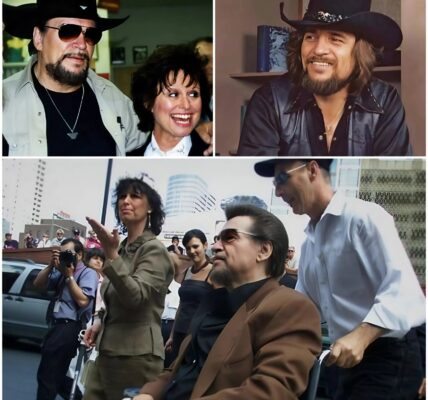Dolly Parton and the Timeless Farewell of “I Will Always Love You”
Music often captures the heart in ways words alone cannot, and few songs illustrate this better than Dolly Parton’s “I Will Always Love You.” While Whitney Houston’s powerhouse rendition brought the song to global fame decades later, the origins of this timeless ballad are deeply personal, intimate, and rooted in the quiet emotional complexity of Dolly Parton’s early career. Long before stadiums erupted with applause, before millions knew her name, Dolly was navigating the delicate balance of ambition, loyalty, and love — both professional and personal.

In the early 1970s, Dolly Parton was a rising star on The Porter Wagoner Show, a nationally televised program that showcased her extraordinary talent. The show not only gave her exposure but also paired her with Porter Wagoner, a prominent country singer who became her mentor, duet partner, and, in many ways, a father figure in the music industry. Their collaboration brought success, popularity, and recognition, but it was also a relationship layered with emotional complexity. Dolly admired Porter deeply, but as her confidence grew and her ambitions expanded, she realized that staying in his shadow would limit her creative independence.
The decision to pursue a solo career was not easy. It meant leaving behind not only a mentor but also a partnership that had shaped the first critical phase of her career. The separation had the potential to become bitter, as is often the case when professional relationships intertwine so closely with personal affection. Dolly could have approached the situation with argument or resentment, but she chose a path that reflected both her artistic sensibility and emotional intelligence: she turned to songwriting.
“I Will Always Love You” was born from that decision. Dolly wrote it as a farewell — not a romantic love song, but a song of gratitude, respect, and enduring affection. Her lyrics were simple yet profoundly moving, capturing the essence of parting with dignity:
“If I should stay,
I would only be in your way.
So I’ll go, but I know
I’ll think of you each step of the way.”
These words convey an emotional honesty that transcends circumstance. They are heartfelt, acknowledging the pain of separation while celebrating the connection that had existed. In the quiet of her own space, Dolly penned a song that spoke to the complexities of human relationships: love intertwined with ambition, gratitude intertwined with loss, and loyalty intertwined with the need for personal growth.

When Dolly played the song for Porter Wagoner, he wept. His tears were not of anger or resentment but of understanding. He recognized the song as Dolly’s way of expressing both farewell and respect. In that moment, music became more than entertainment; it became communication, a bridge between hearts, a vessel carrying emotion that words alone could not fully contain. Dolly’s tender, lilting voice emphasized the sincerity of her message, her phrasing delicate yet imbued with strength, creating an intimacy that could move even the most stoic listener.
Dolly recorded the song and it quickly became a hit on the country charts, topping them twice over during her career. The song’s popularity was not merely a testament to its technical excellence or melodic appeal, but to its emotional truth. Listeners connected with the authenticity in Dolly’s voice, the subtle vibrato, the gentle rise and fall of phrasing, and the purity of sentiment. Each performance communicated a message: it is possible to leave a relationship — romantic, professional, or otherwise — with love intact, without bitterness or regret.
Decades later, Whitney Houston’s rendition in The Bodyguard would transform “I Will Always Love You” into a global phenomenon. Houston’s soaring vocals, dramatic crescendos, and commanding presence brought the song to audiences far beyond the country genre, yet the core sentiment remained unchanged. The song’s essence — farewell, respect, gratitude, and enduring love — still resonated, demonstrating the timeless quality of Dolly’s original composition. While Whitney’s version emphasized vocal power and emotional intensity on a grand scale, Dolly’s original performance highlighted subtlety, vulnerability, and heartfelt intimacy. Each interpretation complements the other, proving that the song’s emotional architecture is versatile, universal, and enduring.
Beyond its commercial success, “I Will Always Love You” has become a cultural touchstone, a lesson in grace and emotional intelligence. It illustrates how one can navigate separation without conflict, how one can honor bonds even while seeking independence, and how music can transform deeply personal experiences into universal messages. For Dolly, the song represented closure: the ability to express love and gratitude while stepping forward into a new chapter of life. Her voice — soft yet unwavering, tender yet confident — communicated a wisdom that goes beyond fame or musical technique.

The song’s enduring popularity also underscores Dolly Parton’s unique ability to combine personal authenticity with artistic brilliance. She managed to capture an intensely private sentiment and present it in a way that resonates with millions. Every note, every word, and every subtle inflection in her voice carries emotional weight. This is part of why the song remains relevant, decades after its original release: its message is universal, its delivery genuine, and its emotional impact timeless.
Moreover, “I Will Always Love You” is an example of the transformative power of songwriting. In choosing to write instead of confront, Dolly created art that elevated personal experience into a form of expression that could educate, console, and inspire. The song is a masterclass in emotional storytelling: it does not rely on spectacle or complexity, but on simplicity, honesty, and the ability to communicate deeply felt emotion through melody and phrasing. Dolly’s gentle yet expressive voice guides the listener, creating a sense of intimacy, as though the song is a personal conversation between performer and listener.
The impact of the song extends beyond professional relationships as well. It has been used in countless farewell moments, personal tributes, and expressions of love, showing its versatility and enduring emotional resonance. Its message of leaving with dignity and love continues to inspire people navigating endings of all kinds — romantic, familial, or professional. Dolly Parton’s artistry demonstrates that vulnerability and honesty are not weaknesses; they are powerful instruments of connection, capable of transcending circumstance, culture, and time.
Reflecting on Dolly’s career, “I Will Always Love You” stands as a pivotal moment: a song that encapsulated her growth as an artist and as a person. It transformed a difficult professional decision into a masterpiece, one that not only secured her independence but also celebrated her bond with Porter Wagoner. It is a reminder that life’s most meaningful expressions often arise from moments of challenge, where emotion and creativity intersect.

In the broader context of music history, the song also illustrates the evolution of a composition across generations. Dolly’s version emphasizes subtlety and intimate emotion, while Whitney Houston’s rendition magnifies the song’s emotional scope with vocal grandeur. Both interpretations, though different, honor the core message — a testament to Dolly’s genius as a songwriter. The song transcends genre and generation, proving that true artistry lies in the universality of feeling and the authenticity of expression.
At its heart, “I Will Always Love You” is a study in human emotion. It communicates the bittersweet nature of parting, the courage required to walk away with integrity, and the power of expressing gratitude even in separation. Dolly’s voice, crystalline and emotionally nuanced, carries the listener through the complexities of human relationships, demonstrating that farewells can be beautiful, meaningful, and full of love.
In conclusion, Dolly Parton’s “I Will Always Love You” is far more than a hit song; it is a timeless lesson in grace, courage, and emotional intelligence. It reflects a woman’s ability to honor relationships, pursue her own path, and transform personal experience into art that touches millions. Through her tender phrasing, expressive vocals, and heartfelt lyrics, Dolly immortalized a moment of farewell into a universal anthem of love, respect, and closure. The song’s enduring legacy, amplified by later renditions and global recognition, continues to remind listeners everywhere that the most powerful expressions of emotion are those rooted in honesty, vulnerability, and heartfelt human connection.




